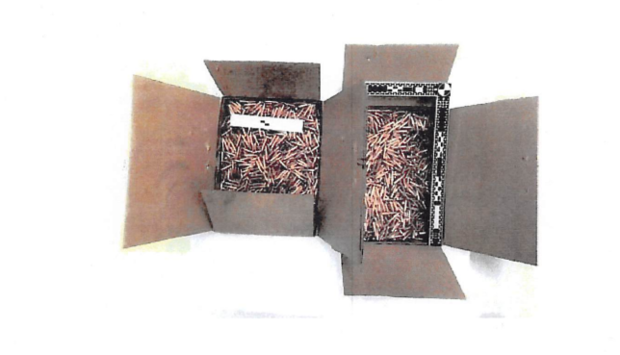Seven charged in Russian smuggling ring involving New Hampshire and New Jersey residents
Washington — A Russian man living in New Hampshire allegedly used his Merrimack home as a "transshipment point" to smuggle American-made military-grade equipment into Russia, part of a coordinated effort to evade U.S. export laws, federal prosecutors announced Tuesday.
Alexey Brayman is one of seven defendants charged in a 16-count indictment, accused of participating an international scheme to transport American products to Russia through countries including Estonia, Finland, German and Hong Kong, in violation of federal law.
Brayman's codefendants include a U.S. citizen from New Jersey, a technical director for a Moscow-based machinery company that contracts with Russian intelligence and a Russian national who once lived in Brooklyn.
According to the indictment unsealed in the Eastern District of New York, since 2017 through at least the spring of 2022, Yevgeniy Grinin, Aleksey Ippolitov, Boris Livshits, Svetlana Skvortsova, Vadim Konoshchenok, Vadim Yermolenko, and Brayman, used shell companies, fake addresses and counterfeit shipping labels to transport the equipment to Russia.
The goods alleged to have been smuggled include "advanced electronics and sophisticated testing equipment" to be used in nuclear weapons development and other military and space-based military applications. Investigators say the items were repackaged and shipped from several "intermediate locations" once they reached Europe and Asia before they were ultimately sent to Russia.
Prosecutors say the defendants coordinated their efforts to break U.S. export control laws that restrict commerce with Russia, specifically laws enacted in response to the Kremlin's invasions of Ukraine in 2014 and 2022.
After Russia invaded Ukraine in February 2022, the Treasury Department sanctioned two of the Russian companies at the center of the alleged plan — Serniya and Sertal — and even targeted Grinin himself, describing the entire network as "instrumental to the Russian Federation's war machine."
The pipeline described in court papers allegedly began with companies in the Russian defense and technology industries making requests of Ippolitov for the American equipment, and he would then hand off the orders to Grinn and Skvortsovato to secure funding.
Livshits is accused of communicating directly with the U.S. companies, often using the alias "David Wetksy" to purchase the desired military-grade equipment. In one example, prosecutors claimed Livshits used the alias in the spring of 2022 — after Russia's invasion of Ukraine had begun — to contact an Illinois-based electronics distributor about purchasing a type of electric signal-monitoring system that is restricted by the Commerce Department for for anti-terrorism reasons.
The Russian national allegedly bought the equipment, known as a dual-use oscilloscope, from the American company for $25,000 and shipped it to Brayman's New Hampshire residence. There, Brayman sent the package to Hamburg, Germany. Yermolenko, who lives in New Jersey, joined Brayman in unlawfully exporting goods from the U.S., according to charging documents.
Investigators say Livshits — who also established and managed numerous shell companies in the U.S. — didn't tell the U.S. companies how the equipment was to be used or that Russian companies were waiting to receive it.
According to the indictment unsealed this month, Brayman and Livshits allegedly discussed sending goods to Russia through Germany "by hook or by crook."
And as recently as Oct. 22, Konoshchenok, a Russian national living in Estonioa, was stopped by police on that country's border with Russia, where law enforcement allegedly found 35 types of semiconductors, thousands of 6.5mm bullets originally made in Nebraska, and ammunition for sniper riffles.
Konoshchenok, a suspected Russian intelligence officer, is accused of smuggling numerous U.S.-made goods from Estonia to Russia, including dual-use electronics, military-grade tactical ammunition and other export-controlled items, the Justice Department said.
"With three of the defendants now in custody, we have disrupted the procurement network allegedly used by the defendants and Russian intelligence services to smuggle sniper rifle ammunition and sensitive electronic components into Russia," Attorney General Merrick Garland said in a statement. "The Justice Department will continue to vigorously enforce our economic sanctions and export controls against those who enable the Russian government to continue its unjust war in Ukraine.
The investigation into the smuggling scheme was coordainated by the department's Task Force Kleptocapture, an interagency response to Russia's invasion of Urkaine earlier this year led by Deputy Attorney General Lisa Monaco.
According to the Justice Department, Brayman surrendered to the FBI and was released Tuesday after posting $150,000 in bond. Yermolenko was arrested in New Jersey and also released on bond. Yermolenko pleaded not guilty.
Konoshchenok was taken into custody by Estonian authorities on Dec. 6 at the request of the U.S. and is now pending extradition. The other defendants remain at large.
"At this stage Mr. Brayman has only been charged, he has not been convicted of anything. Like all defendants, Mr. Brayman is entitled to the presumption of innocence," David Lazarus, his attorney, said in a statement on Tuesday.
Yermolenko's public defender, Nora Hirozawa, declined to comment further.
The pair is expected to be back in court in February.





